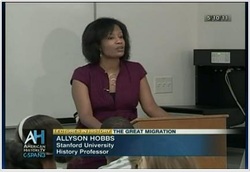Dear Priya, Kavya, Smrithi and Maanasa,
My grandmother (who will turn 101 in June) was thrilled to hear your questions! She wishes you the best of luck with your project.
My grandmother voted for the first time in 1945 when she arrived in Chicago (she migrated from New Orleans, LA). She and my other family members greatly enjoyed voting, especially because they were not able to vote in New Orleans.
She never voted before she lived in Chicago. When I asked her about this, she said that very few black people tried to vote because they would have been turned away at the polls. If they were not turned away, they would have had to interpret a very complex passage of the Louisiana state constitution, or they would have been asked to complete some other impossible task. When they failed at this task, they would have been told that they could not vote.
My grandmother said that in New Orleans, blacks had very few rights. They could not eat in the fancier restaurants, they could not try on clothing in department stores, black children went to inferior schools, and blacks had to sit in the "attic" at the movies.
My grandmother also experienced violence. While walking with her cousin on a main street in a retail district in New Orleans, my grandmother was struck by a rock that was thrown by a white man. The rock hit her just above her eye. When she went to a drug store for help, the white drug store owner turned her away.
I do think that the passage of the Voting Rights Act and the Civil Rights Act made a major difference. The South began to change and many blacks have chosen to move back, creating a "reverse migration." But many blacks, like my grandmother, have such terrible memories of their experiences in the South, they will never go back.
Best wishes with your project!!
Very best,
Allyson
My grandmother (who will turn 101 in June) was thrilled to hear your questions! She wishes you the best of luck with your project.
My grandmother voted for the first time in 1945 when she arrived in Chicago (she migrated from New Orleans, LA). She and my other family members greatly enjoyed voting, especially because they were not able to vote in New Orleans.
She never voted before she lived in Chicago. When I asked her about this, she said that very few black people tried to vote because they would have been turned away at the polls. If they were not turned away, they would have had to interpret a very complex passage of the Louisiana state constitution, or they would have been asked to complete some other impossible task. When they failed at this task, they would have been told that they could not vote.
My grandmother said that in New Orleans, blacks had very few rights. They could not eat in the fancier restaurants, they could not try on clothing in department stores, black children went to inferior schools, and blacks had to sit in the "attic" at the movies.
My grandmother also experienced violence. While walking with her cousin on a main street in a retail district in New Orleans, my grandmother was struck by a rock that was thrown by a white man. The rock hit her just above her eye. When she went to a drug store for help, the white drug store owner turned her away.
I do think that the passage of the Voting Rights Act and the Civil Rights Act made a major difference. The South began to change and many blacks have chosen to move back, creating a "reverse migration." But many blacks, like my grandmother, have such terrible memories of their experiences in the South, they will never go back.
Best wishes with your project!!
Very best,
Allyson
